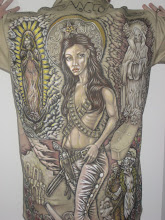A human has to know when to speak and when to contemplate. When plans fail and when the world suddenly shows a mysterious and unexpected face, wisdom requires wonder, not words or overt action ~ the activity of meditation suggests itself.
Meditation is a "going within," a retreat from the practical world; to the outsider, one who goes into retreat may appear sickly, wounded, weak. And all of these may be true, in any case. However, it is from this position of weakness and need and intense introversion that one may begin to glimpse truth -- it is in silence, quiet, and humility that truthfulness about the great question that is life shows itself: a stalking tiger, otherwise invisible, emerging from the brush to drink, unaware of the careful observer nearby. A quick flash of shadowed stripes and orange and it is gone.
Others, huntsmen caught up in their dramas and safaris, miss the thing entire, misunderstand the scene, look high and low for what sauntered past them in the high grass at evening. The shaman meanwhile, in his insanity, in the quiet, charmed circle of solitude alone communes with
the thing itself moving by -- for reality is always a "moving by."
****
Since 2008, I have fallen into a relative silence as a thinker. Here and there I emerged to comment on the fragments of sense I managed to seize from the passing senselessness -- making an attempt to scry some sort of pattern in the fragments of previous years. That prolonged period of struggle lasted till February 2011 when I emerged from my dark, magic circle of silence and assembled some of my thoughts into an eBook, "Philosophy and Other Bad Habits," available at Lulu.com.
This is not entirely hucksterism -- though I will admit inserting a commercial into a short essay runs clean against the grain. If you go to the site, though, and look, you will find I am hardly attempting to make a great deal of money from this project. What I am up to is spreading ideas and beginning to lay a foundation for what I intend to say and do next.
My enemies -- and I would suggest yours, too -- are extreme capitalists of a sort, laissez-faire free marketeers, and they run the table at which we all play; they maintain control of the spread of ideas by keeping thinkers not merely silent and contemplative (that happens on its own) but voiceless and without a platform; or what is the same, drowned in a flood of chatter, propaganda, and myths.
In our culture, the selfish have rigged the game -- it becomes impossible to even speak out against the system without participating in it: money enters into all considerations -- not in any sensible way, but as the entire point of all human endevours; the ethics of selfishness is either embraced or else we are forced to lie down with it, whore-like, in order to have the privilege of free speech.
So, even the intellectual, to have a moment to speak, will be forced to appear as a salesman, bag of wares in hand, to beg for a few shekels to keep body and soul together, to support another day of wonder and writing. You will pardon me if I confess there is something filthy in this and that I understand why Socrates never accepted silver for his labors, even to the point of poverty.
But I am no Athenian, nor am I a Socrates, of the heroic cast of a Socrates. I am an intellectual guerrilla and the first thing to go in order to spread ideas and ask questions was too much pride.
I don't own a press. Were I wealthy enough, I would, and I would publish the ideas and thoughts of those who question this and all societies in the name of justice and mercy -- I would talk of moral revolution and raising people from the level of an undifferentiated mass kept ignorant by superstition, lies, and common opinion up to the level of thinking, questioning, historically aware and truly free individuals, ruling themselves by means of civil society, constitutional democracy, recognition of civil and human rights, and economic democracy -- the respect for basic human dignity applied to work and economy.
I won't live to see any of that, not here. But I will, as long as I am able, think, meditate, bring back my small contributions to these ideals in the forms of popular essays and art, illustrations, cartoons. I have no think tank money to prop me up. I have no political organization propaganda money to subsidize my books or get them published, distributed, and artifically jacked up on the best seller lists like Regnery. I have no billionaire benefactors. I am underground, busted, fighting from an unpopular position, pretty much alone.
I don't offer a "product." I offer to share a concrete portion of my life. And, yes, it will cost a couple of dollars to see it. After that, you may pass my eBook around to your poorer or lazier friends as you see fit, if you see fit. I don't mind. I am no prophet, and not much of a propagandist -- I am a philosopher and I see things in my own way from my own perspective in order to encourage others to become and do the same.
But if I am going to speak, I need an audience as assuredly as Socrates needed the Agora.
People like me do not change the world. We change ourselves. And then we share what we discover, hard-won, in the laboratories of existence with others who then choose what, if anything, to do with the ideas. You change the world. I am simply asking for an opportunity to encourage you to do so.
Richard Van Ingram
3 March 2011
